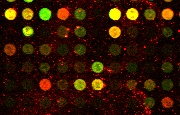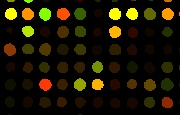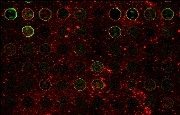








|
|
|
cDNA Image Noise
A number of impairments, resulting from the nature of cDNA microarray
technology, affect the cDNA microarray image formation. Therefore,
microarray images exhibit variations in intensity attributed mainly to
variations in the image background, variations in the spot sizes and
positions, artifacts caused by laser light reflection and dust on
the glass slide, and photon and electronic noise introduced during
scanning.
| |

Acquired cDNA image |
= |

Ideal cDNA image |
+ |

Noise signal |
|
|
Due to numerous noise sources in cDNA microarray technology, the
microarray image formation is a complicated, nonlinear process
influenced by many factors. The various image impairments can be
represented by a noise signal with the vectorial samples considered
random in nature. The acquired cDNA image can be modeled using
the additive noise model with ideal and noise signals considered as the
input. The noise signal is considered either impulsive in nature or it
can be modeled as mixed noise, i.e. white additive Gaussian noise
followed by impulsive noise. |
|
|
References: |
|
 | R. Lukac and K.N. Plataniotis, "cDNA Microarray
Image Segmentation Using Root Signals," International
Journal of Imaging Systems and Technology, vol. 16, no. 2,
pp. 51-64, April 2006. |
 | R. Lukac, K.N. Plataniotis, B. Smolka, and A.N.
Venetsanopoulos, "cDNA Microarray Image Processing Using Fuzzy
Vector Filtering Framework," Fuzzy Sets and Systems,
Special Issue on Fuzzy Sets and Systems in Bioinformatics,
vol. 152, no. 1, pp.17-35, May 2005. |
 | R. Lukac, K.N. Plataniotis, B. Smolka, and A.N.
Venetsanopoulos, "A Multichannel Order-Statistic Technique for
cDNA Microarray Image Processing," IEEE Transactions on NanoBioscience,
vol. 3, no. 4, pp. 272-285, December 2004. |
|
|
|
